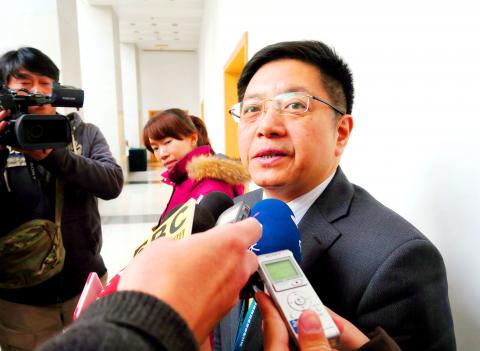The central government yesterday expressed its deep regret and discontent with the International Criminal Police Organization’s (Interpol) rejection of its bid to attend the organization’s upcoming general assembly.
Asked if Beijing was behind Interpol’s decision, Minister of Foreign Affairs David Lee (李大維) said “that is a very obvious factor.”
Presidential Office spokesman Alex Huang (黃重諺) last night urged China to acknowledge the Republic of China’s existence and stop hurting the well-being of Taiwanese by obstructing Taiwan’s participation in international organizations.

Photo: CNA
The government will continue to work closely with the US and other like-minded nations to promote Taiwan’s participation in Interpol, in the hope that Taiwan can be included in the global network for public security protection, the Ministry of Foreign Affairs said.
Taiwan was forced to withdraw from Interpol in 1984 when China joined the organization.
For the first time in 32 years, the government last month applied to participate as an observer at Interpol’s 85th general assembly, which runs from tomorrow to Friday in Bali, Indonesia.
Interpol president Mireille Ballestrazzi and secretary-general Jurgen Stock separately wrote to Criminal Investigation Bureau Commissioner Liu Po-liang (劉柏良) stating the organization’s decision to turn down Taiwan’s application, the ministry said.
The ministry said that Taiwan’s bid to participate in the assembly does not involve politics, but is intended to facilitate cooperation with the police forces of other nations and contribute to global efforts against organized crime, cybercrime, cross-border crime and terrorism.
With cross-border crime becoming a serious problem amid globalization, having no access to Interpol information is posing a challenge to Taiwan’s crime-fighting operations, the ministry said, urging Interpol to deal with Taiwan’s case positively and pragmatically based on the need to maintain global security.
Considering the need to maintain security during next year’s Universiade in Taipei, the ministry has also requested that Interpol allow Taiwan to access its I-24/7 global police communications system and the Stolen and Lost Travel Documents database.
Meanwhile, the ministry said it appreciated the US’ support for Taiwan’s participation in the assembly.
Both the US Senate and House of Representatives in March passed legislation requiring the US secretary of state to develop a strategy to obtain observer status for Taiwan in Interpol. The bill was then signed into law by US President Barack Obama.
Separately yesterday, the Mainland Affairs Council urged China to stop obstructing Taiwan’s efforts to particiate in international organizations.
Taiwan and China should treat each other in a friendly way and seek to resolve differences of opinion through bilateral dialogue in the interests and well-being of their people, the council said.
A survey conducted by the council last month revealed that 80 percent of Taiwanese believe Taiwan’s bids to take part in international organizations should not be subject to political interference, the council said, urging Beijing and the international community not to ignore public opinion in Taiwan.
Additional reporting by Su Fang-ho

CHAOS: Iranians took to the streets playing celebratory music after reports of Khamenei’s death on Saturday, while mourners also gathered in Tehran yesterday Iranian Supreme Leader Ayatollah Ali Khamenei was killed in a major attack on Iran launched by Israel and the US, throwing the future of the Islamic republic into doubt and raising the risk of regional instability. Iranian state television and the state-run IRNA news agency announced the 86-year-old’s death early yesterday. US President Donald Trump said it gave Iranians their “greatest chance” to “take back” their country. The announcements came after a joint US and Israeli aerial bombardment that targeted Iranian military and governmental sites. Trump said the “heavy and pinpoint bombing” would continue through the week or as long

TRUST: The KMT said it respected the US’ timing and considerations, and hoped it would continue to honor its commitments to helping Taiwan bolster its defenses and deterrence US President Donald Trump is delaying a multibillion-dollar arms sale to Taiwan to ensure his visit to Beijing is successful, a New York Times report said. The weapons sales package has stalled in the US Department of State, the report said, citing US officials it did not identify. The White House has told agencies not to push forward ahead of Trump’s meeting with Chinese President Xi Jinping (習近平), it said. The two last month held a phone call to discuss trade and geopolitical flashpoints ahead of the summit. Xi raised the Taiwan issue and urged the US to handle arms sales to

BIG SPENDERS: Foreign investors bought the most Taiwan equities since 2005, signaling confidence that an AI boom would continue to benefit chipmakers Taiwan Semiconductor Manufacturing Co’s (TSMC, 台積電) market capitalization swelled to US$2 trillion for the first time following a 4.25 percent rally in its American depositary receipts (ADR) overnight, putting the world’s biggest contract chipmaker sixth on the list of the world’s biggest companies by market capitalization, just behind Amazon.com Inc. The site CompaniesMarketcap.com ranked TSMC ahead of Saudi Aramco and Meta Platforms Inc. The Taiwanese company’s ADRs on Tuesday surged to US$385.75 on the New York Stock Exchange, as strong demand for artificial intelligence (AI) applications led to chip supply constraints and boost revenue growth to record-breaking levels. Each TSMC ADR represents

State-run CPC Corp, Taiwan (CPC, 台灣中油) yesterday said that it had confirmed on Saturday night with its liquefied natural gas (LNG) and crude oil suppliers that shipments are proceeding as scheduled and that domestic supplies remain unaffected. The CPC yesterday announced the gasoline and diesel prices will rise by NT$0.2 and NT$0.4 per liter, respectively, starting Monday, citing Middle East tensions and blizzards in the eastern United States. CPC also iterated it has been reducing the proportion of crude oil imports from the Middle East and diversifying its supply sources in the past few years in response to geopolitical risks, expanding